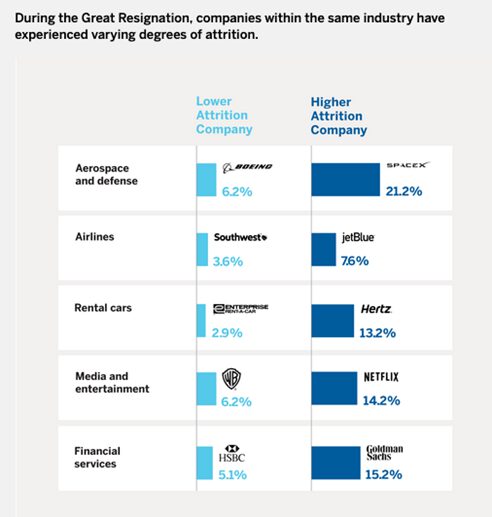A lot of heady talk surround “the great resignation.” An article in Wired magazine cited a report from Deutsche Bank’s chief UK economist stating “that people are resigning at the highest rate since 2009”.
The Harvard Business Review reports:
According to the U.S. Bureau of Labor Statistics, 4 million Americans quit their jobs in July 2021. Resignations peaked in April and have remained abnormally high for the last several months, with a record-breaking 10.9 million open jobs at the end of July.
Post-Covid, resignations and job openings have swelled, launching sometimes fierce competition for talent. Employers dangle higher wages, better perks, and bonuses before employees in attempts to lure them into workplaces.
Some analysts suggest that a lot of folks quit during the pandemic and just don’t want jobs. With early retirements fueling some of the activity, this makes sense. However, analysis shows great variations in resignation rates across industries, so there must be more at play.
Also from Harvard Business Review:
While resignations actually decreased slightly in industries such as manufacturing and finance, 3.6% more healthcare employees quit their jobs than in the previous year, and in tech, resignations increased by 4.5%. In general, we found that resignation rates were higher among employees who worked in fields that had experienced extreme increases in demand due to the pandemic, likely leading to increased workloads and burnout.
However, it was Harvard’s neighbor, the MITSloan Management Review, that provided the most convincing take on the great resignation within industries. It boiled down to: People quit jobs that sucked. Retail apparel had the highest attrition rate at 19%, followed by:
- Management consulting (16%)
- Internet (14%)
- Enterprise software (13%)
- Fast food (11%)
- Specialty retail, Research hospitals, Hotels and leisure (11% each)
Then, the folks at MITSloan also looked at the range in attrition rates within industries:

Source: MITSloan Management Review
The difference? Toxic corporate culture was the top predictor of attrition in an analysis of more than 170 culture topics:
A toxic corporate culture is by far the strongest predictor of industry-adjusted attrition and is 10 times more important than compensation in predicting turnover. Our analysis found that the leading elements contributing to toxic cultures include failure to promote diversity, equity, and inclusion; workers feeling disrespected; and unethical behavior.
Low pay, poor working conditions, toxic cultures. All it took was a global pandemic for a lot of workers to stop putting up with them. What’s your take on the great resignation?
-Leonce Gaiter, VP of Content and Strategy






